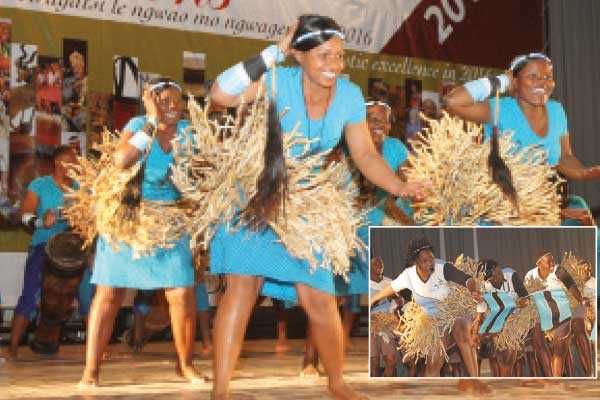Dazzling Seperu dances win hearts at President’s Day fiesta
Traditional song and dance lovers thronged SSKB Auditorium to once again witness first hand the crème de la crème of Botswana’s performing arts. They had come to see their favourite groups competing in the traditional song and dance category.
This is the only one, out of all the categories in the annual President’s Day Celebrations competition spectacular that takes well over ten hours from start to finish, and the only one that attracts multitudes. Even though the organisers recently introduced an entry fee, this has done very little to deter multitudes from attending the event. Every year the auditorium is packed to the rafters, and it’s not difficult to see why. Everyone wants to come and show passion for their favourite groups.
Backstage it is a completely different story.
The holding room always sees dozens of props that come in different shapes and sizes and makes. One can almost wonder how many trucks are used to ferry all these props. The tension can be cut with a knife. None of the groups comes here prepared to play anyone’s second best. And the emotions on their faces tell the tale that the journey to the finals is not an easy one.
Forty groups from ten categories namely Diware, Seperu (Chobe and North West), Setapa, Phathisi, Dikhwaere, Sebirwa, Tsutsube, Hosana and Polka were ready for battle. Rivals came prepared to finally prove themselves. The reigning champs also had something to prove. Eyes on them, groups such as Dipela tsa ga Kobokwe from the Phathisi category knew that their rivals such as Kala tsa Kgale from Selibe Phikwe had a bone to chew with them.
And that they would not hand over the crown to them lying down on the ground. The Molepolole group that was bestowed with the Meritorious Service Award in 2014 has been retaining the crown from as far as one can remember, and some people were certain that 2016 might be the year when they kiss the crown goodbye. As scintillating as most of the performances were, the day belonged to the Seperu groups. Since the introduction of Seperu in the competition, this category has been gaining momentum every year.
Today, when the groups are on stage, the audience is hyped up and they appreciate the dance.
A new development saw the category being divided into two this year, namely Seperu (Chobe) and North West. Groups that participate in the Seperu from the Chobe area are mostly adults, and the dance is celebratory. The women wear an attire that is made up of a number of skirts that they tilt in the air, displaying different colours underneath them like they were peacocks. The performance is punctuated by a sound that depicts the noise made by doves/maphoi.
For the North West however, the groups are mostly made up of the youth and it revolves around rituals. Wearing traditional reeds, that they shake into the ground, the four groups in this category namely Shiqhakao and Tiwazani both from (Gumare) and Diyathoteng and Mavuashire (both from Ikoga) were a marvel to watch. At one point it appeared as if some of the dancers would break their knees, judging by the way they were masterfully moving them. Shiqhakao were crowned the winners under the North West category, and Itenge from Mabele won the Chobe category. Meanwhile, something that the groups need to take note of, as raised by the judges in their remarks, is that they need to be original and creative.
A disturbing factor this year is how groups are now losing their identity, with most groups copying each other’s signature moves. The judges have also cautioned groups to ensure that they bring props that are relevant to their performance as well as to refrain from over-borrowing other groups’steps and styles. An example being the Seperu category where groups from the Chobe and North West were borrowing the sound of the drums from another region. “In the Diware category, it showcases a healing dance, and they need to be very cautious that they showcase that,” noted the judges in their remarks.
They also pointed out that dances like Setapa is a happy dance, hence the dancers should take note of the rhythm and be gentle on the ground. The rest of the winners are Mushamba wa kare (Diware), Khuduthamaga Cultural Troupe (Setapa), Dipela tsa ga Kobokwe (Phathisi), Lesedi (Dikhwaere), Retlaare ke dipitse (Sebirwa), Gata la tau (Tsutsube), Tjilenje the Ngwao (Hosana), Kalahari Dancers Polka group (Polka).




